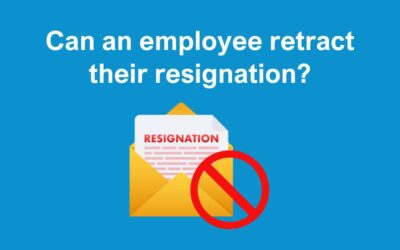An Employee resignation is a common occurrence in the workplace. While it can be challenging to see a valuable team member leave, it’s essential for employers to handle the situation professionally and ensure a smooth transition. There are specific steps that employers need to take when an employee resigns.
This blog post aims to provide guidance on what you should do when faced with such a situation.
Acknowledge the Resignation
The most important thing to do if someone resigns is acknowledged their resignation in writing. There are a number of things you should confirm in the resignation acknowledgement letter, including:
- After the employee resignation, work out the agreed last date of employment, including confirmation of the required notice period – this helps avoid any disputes over final dates of employment or notice periods;
- when they will be paid their last pay; and
- confirm any holiday pay they may be due as a result of holidays accrued but not taken.
There may be circumstances when an employee owes you money e.g. because they have taken more holiday than they have accrued; or perhaps because you have paid for training for them and it’s in their contract that this is to be repaid – this too should be confirmed in writing in the employee resignation acknowledgement letter. Please note that some caution should be exercised before making any deductions from someone’s final salary. We can advise on this if you need help.
Verbal Resignation
On occasion, you may find someone resigns verbally in the heat of a moment. It’s always good practice to allow them a chance to cool off. Then following this you should revisit their decision to verbally resign with them and check that they are sure this is what they want to do. If their decision remains to resign you should ask them to confirm this to you in writing to you, and you should then acknowledge this in writing, as above.
If they don’t confirm in writing in their employee resignation, you should write out to them acknowledging their verbal resignation and confirm everything in writing. In these circumstances, you should send recorded delivery to demonstrate you have a paper trail should they attempt to dispute later they did resign.
Conduct an Exit Interview
Offer the departing employee an opportunity to participate in an exit interview. This interview can provide valuable insights into their reasons for leaving, their overall experience with the company, and suggestions for improvement. It allows you to gain feedback and identify areas where you can make positive changes to retain future employees.
Communicate with the Team
Once the employee resignation is confirmed, communicate the news to the rest of your team. Be transparent and avoid speculation or rumours. Address any concerns they may have, provide reassurance, and discuss how you plan to manage the workload during the transition period. Open lines of communication can help maintain morale and reduce anxiety among the remaining employees.
Prepare for Knowledge Transfer
If the resigning employee holds critical knowledge or responsibilities, take proactive measures to ensure a smooth transfer of their duties. Identify potential successors or individuals who can temporarily fill the gap. Arrange for knowledge-sharing sessions or provide relevant documentation to facilitate a seamless handover.
Conduct an Internal Review
Take the employee resignation as an opportunity to reflect on the departure and evaluate if there are any underlying issues within your organisation. Assess whether the resignation was isolated or indicative of a larger problem, such as low employee morale, lack of growth opportunities, or ineffective management practices. Use the insights gained to implement changes and improve retention rates in the future.
Process Final Payments
Calculate the employee’s final payment, including salary, any outstanding leave entitlement, and other applicable benefits or bonuses. Ensure that all necessary deductions, such as taxes and pension contributions, are accounted for correctly. Pay the final amount promptly, in accordance with legal requirements and your internal payroll procedures.
Handle Company Property and Access
Once you receive an employee resignation, retrieve any company property in the possession of the departing employee, such as laptops, access cards, or keys. Terminate their access to company systems, databases, and email accounts, ensuring that all confidential information is protected. Follow your organisation’s protocols to safeguard sensitive data and maintain the security of your systems.
Some other useful things to consider when you receive a resignation include:
- Do you wish your employee to work out their full notice period? If their contract provides it you may find it helpful to pay them in lieu of all or part of their notice period. This will affect when their actual final date of employment is.
- Consider whether garden leave during their notice period might be appropriate, only if their contract has a provision for placing them on garden leave.
- Think about recruiting a replacement – we can help support your recruitment needs with job adverts, screening applicants, arranging interviews etc.
- Do you need to arrange a handover?
- Finally, say farewell and part on good terms
- Be careful about what you include in providing references
In Conclusion
When you receive an employee resignation, it’s crucial for employers to handle the situation efficiently and professionally. Following the steps outlined above will help ensure a smooth transition, maintain positive relationships, and protect the interests of both the departing employee and the organisation. By addressing the resignation process with care, you can mitigate any potential disruptions and set the stage for future success.
Contact Us
Here at the HR Booth, we have the expertise to help make any employee resignation as smooth for you and your business as possible.







